
Boston Marathon bombing investigators search a woman's bag at the scene of the explosions. (REUTERS/Adrees Latif)
The headline in today’s New York Times had to be read twice to make sure that’s what it really said: “Blasts End A Decade of Terrorism on the Wane.”
Yes. On the wane.
You probably didn’t know that over the past ten years there has been very little significant terrorism in the United States. As I've written repeatedly, terrorism today—here at home, not in, say, Iraq—is just a nuisance, nothing more. In 2004, John Kerry, running for president, said that the then-infinite War on Terror would be won when terrorism was reduced to the status of being a deadly nuisance rather an a constant crisis. By 2004, of course, it already was.
The Times, in its lede, says this:
The bombing of the Boston Marathon on Monday was the end of more than a decade in which the United States experienced strikingly few terrorist attacks, in part because of the far more aggressive law enforcement tactics that arose after the Sept. 11, 2001, attacks.
Well.
It adds:
In fact, the Sept. 11 attacks were an anomaly in an overall gradual decline in the number of terrorist attacks since the 1970s, according to the Global Terrorism Database, one of the most authoritative sources of terrorism statistics, which is maintained by a consortium of researchers and based at the University of Maryland.
The worst decade for terrorism in the United States? The 1970s. The horrible bombings in Boston killed more people, three, than any incident of terrorism except 9/11, the 1993 World Trade Center attack, the 1995 Oklahoma City bombing, and “the poisoning of restaurant salad bars with salmonella bacteria by religious cultists in Oregon in 1984.”
The paper quotes Gary LaFree, the researcher who helps compile the date base, thus:
I think people are actually surprised when they learn that there’s been a steady decline in terrorist attacks in the U.S. since 1970.
And it adds this stunner from LaFree:
He said there were about 40 percent more attacks in the United States in the decade before Sept. 11 than in the decade after.
You can take a look at LaFree’s data base and other research at his website, with the Global Terrorism Database. It’s part of the National Consortium for the Study of Terrorism and Responses to Terrorism. Especially important is the graph that shows incidents of terrorism declining from nearly 500 per year in the early 1970s in the United States, steadily throughout the next four decades, to an all time low in 2011. See below:
Yes, you read that right: an all time low!
Boston bombs: FBI probes deadly marathon 'terror' blasts
An investigation is under way after two explosions near the finishing line of the Boston Marathon left three people dead and at least 140 injured.
The FBI has taken over co-ordination of what it described as a "potential terrorist inquiry".
Boston police say their officers are working around the clock and all leave has been cancelled.
No group has said it carried out the attack, which left at least 17 people critically wounded, officials say.
One of the dead was an eight-year-old boy, Martin Richard. Several of those injured have had to have limbs amputated.
In a televised address, President Barack Obama vowed to bring those behind it to justice.
"We will find out who did this. We'll find out why they did this," he said.
"Any responsible individuals, any responsible groups, will feel the full weight of justice."
Although he did not use the word "terrorism", a White House official later said: "Any event with multiple explosive devices - as this appears to be - is clearly an act of terror, and will be approached as an act of terror."
The first explosion came at about 14:50 local time (18:50 GMT) on the north side of Boylston Street, about two hours after the winners crossed the line.
There was initial confusion and panic. Some runners fell to the floor while police and bystanders ran to help those caught in the blast.
Then seconds later, another explosion ripped into the crowd further away from the finishing line, about 170m from the first blast.
TV footage showed bloodied runners and spectators being treated at the scene and the road strewn with debris. Rescuers tore down temporary fencing to reach the casualties.
At least 140 people were injured, with injuries including severed limbs, shrapnel wounds, cuts and bruises.
At an initial news conference on Monday evening, Boston Police Commissioner Edward Davis said authorities had received "no specific intelligence that anything was going to happen".

A search thought to be related to the inquiry was under way at a flat in a Boston suburb, Boston media reported.
Police said a search warrant was issued on Monday in the Revere district but provided no further details.
The White House and security experts are being cautious as to whether domestic terrorist groups or jihadists were behind the attacks, says the BBC's security correspondent, Gordon Correra, in Washington.
The device itself is thought to be fairly crude and there is a very clear focus on finding the evidence rather than speculating, he adds.
Massachusetts Governor Deval Patrick said Boston would be "open" on Tuesday but that there would be "a heightened law enforcement presence".
"There will be random checks of backpacks and other parcels. We are also asking that everyone be on a state of heightened vigilance," he said.
Details of the victims have also not been officially released, but eight-year-old Martin Richard, from Boston, has been named as one of those killed.
His mother and sister were also injured as they waited for his father to finish the race.
Officers are examining video and photographs from the marathon and have appealed for people to hand over their own videos and photos to help with the investigation.
Unconfirmed reports said two other unexploded devices were found near the end of the race but were safely defused.
State police officer Roupen Bastajian had just finished the race when he heard the blasts.
"I started running toward the blast and there were people all over the floor," he said.
"We started grabbing tourniquets and started tying legs. At least 25 to 30 people have at least one leg missing, or an ankle missing, or two legs missing."
A doctor at Massachusetts General Hospital said "several amputations" had been performed there.
As a massive security operation swung into operation, the Federal Aviation Administration barred low-flying aircraft from within 3.5 miles (5.6km) of the site.
Key sites in Washington DC and New York have also seen security tightened.
Shortly after the blasts, a fire broke out at Boston's John F Kennedy Library a few miles away from the explosions.
Police said the blaze might have been caused by an incendiary device but it did not appear to be related to the explosions.
The annual Boston Marathon this year had a field of about 23,000 runners and was watched by hundreds of thousands of spectators.
It is held on Patriots Day, a Massachusetts state holiday which commemorates the first battles of the American Revolution in 1775.
British police said they were reviewing security plans for Sunday's London Marathon - the next major international marathon - but that it was going ahead, saying they were "very, very well-practised" at managing big events.
Investigators spent Wednesday poring over photos and video footage and piecing together shredded remnants of bombs in an effort to zero in on suspects behind Monday's Boston Marathon terror attack.
Even as amateur sleuths analyzed photos of the finish-line crowd and shared their own conclusions, FBI investigators were believed to be doing the same, and there were reports that they were interested in specific images of a person or persons with heavy backpacks. Investigators believe the bombs, at least one of which was likely a pressure cooker bomb laden with explosives and shrapnel, may have been concealed in such a bag. Monday's attack killed three and injured 176, many critically.
A mangled pressure cooker lid found atop a nearby building is believed to have been part of one bomb, and it and other pieces were being analyzed at an FBI lab. A battery and several pieces of shrapnel were also recovered and undergoing analysis. Fox News learned that the circuit board suspected of being used to detonate at least one of the bombs has been recovered, and that FBI investigators were also analyzing cellphone tower records to identify positive hits for signs of calls that may have been placed to trigger both explosions remotely.
The FBI and Boston Police said no arrests have been made in the Boston Marathon bombing. Earlier, FoxNews.com and several other media outlets, including The Associated Press, reported that a suspect had been arrested in the deadly attack.
Investigators believe one, or possibly two, pressure cookers were packed with explosives and shrapnel and hidden in backpacks to be left amid the crowd.
According to a FBI and Department of Homeland Security bulletin, the deadly shrapnel that caused the deaths -- including of an 8-year-old boy, and critical injuries to 17 -- included nails, BBs and ball bearings. The other device "was also housed in a metal container, but investigators could not say if that was also a pressure cooker.
Pressure cooker bombs have been used in high-profile bombings in India, Pakistan and Afghanistan, and have been touted in the Al Qaeda in Yemen's online propaganda magazine Inspire and in the "The Anarchist Cookbook."
The horror unfolded just before 3 p.m., shattering a festive atmosphere several hours after the legendary race began on the city's 238th annual Patriots' Day. In the aftermath, officials found bomb remnants, shrapnel and shredded backpacks believed to have concealed the deadly payloads.
Richard DesLauriers, FBI agent in charge in Boston, confirmed at a press conference investigators had found pieces of black nylon from a bag or backpack and fragments of BBs and nails, possibly contained in a pressure cooker. He said the items were sent to the FBI laboratory at Quantico, Va., for analysis.
The FBI also plans to reconstruct the devices at their headquarters in Quantico, according to MyFoxBoston.com.
Investigators are also examining if the bombs could have been assembled near the scene of the explosions, The Wall Street Journal  reports, quoting a law enforcement official. The official says this possibility is being considered because transporting improvised devices over a significant distance could trigger a premature detonation.
reports, quoting a law enforcement official. The official says this possibility is being considered because transporting improvised devices over a significant distance could trigger a premature detonation.
 reports, quoting a law enforcement official. The official says this possibility is being considered because transporting improvised devices over a significant distance could trigger a premature detonation.
reports, quoting a law enforcement official. The official says this possibility is being considered because transporting improvised devices over a significant distance could trigger a premature detonation.
The officials also say federal agents are working with local police to canvas local hotels and short-term rentals for clues as to where the bombs could have been constructed.
Dr. Peter Burke, chief of trauma services at Boston Medical Center,said Wednesday 19 patients (six males and 13 females) are being treated at the facility. Seven people had amputations and two remain in critical condition, including a 5-year-old boy. He said there will be eight 're-operations' at the hospital.One or two patients may be released later today. He credited Boston EMS and first responders for limiting the loss of life.
He said beside amputations, doctors have been treating lung injuries, likely caused from the force of the explosion or impact on the ground.
"The major (injuries) ones that were life-treating were tissue injuries and vascular injuries," he said.
Tufts Medical Center said it treated 14 patients, seven of whom have been discharged. None of the patients are listed in critical condition. The hospital said it did not have any amputations nor does it expect any in the future.
"This is something I've never seen in my 25 years here," Alasdair Conn, chief of emergency services at Massachusetts General Hospital said Monday night; "this amount of carnage in the civilian population. This is what we expect from war."
An intelligence bulletin issued to law enforcement and released late Tuesday includes a picture of a mangled pressure cooker and a torn black bag, like the one seen below that was first obtained by MyFoxAtlanta.com , that the FBI says were part of a bomb.
, that the FBI says were part of a bomb.
 , that the FBI says were part of a bomb.
, that the FBI says were part of a bomb.
It remained unclear if the bombs were the work of a homegrown or foreign threat, but in Washington, both President Obama and Defense Secretary Chuck Hagel called the attack terrorism.
“Any time bombs are used to target innocent civilians, it is an act of terror,” Obama said Tuesday morning.
Boston Police Commissioner Ed Davis appealed to the public to come forward with any information or photographic evidence that might help authorities zero in on the killers.
The Pakistani Taliban, which has threatened attacks in the U.S. because of its support for the Pakistani government, denied any role in the marathon bombings Tuesday.
The group's spokesman, Ahsanullah Ahsan, denied involvement in a telephone call with The Associated Press. He spoke from an undisclosed location.
Details also emerged Tuesday on the victims of the attack, as scores of victims remained in hospitals, many with grievous injuries.
Eight-year-old Martin Richard, who was with his family cheering on runners at the finish line, is among those dead. The boy's 6-year-old sister lost a leg in the attack and his mother suffered a brain injury.
Krystle Campbell, of Medford, Mass., 29, was also killed in the blast. Her father said she had gone with her best friend to take a picture of the friend's boyfriend crossing the finish line.
William Campbell said his daughter, who worked at a restaurant in nearby Arlington, was "very caring, very loving person, and was daddy's little girl." He said the loss has devastated the family.
The Shenyang Evening News, a state-run Chinese newspaper, identified the third victim as Lu Lingzi. She was a graduate student at Boston University.
The first two explosions occurred at 2:50 p.m. – nearly five hours after the marathon began – about 50 to 100 yards apart, according to Davis. A third explosion occurred near the John F. Kennedy Presidential Library and Museum in the Columbia Point section of Dorchester, several miles southeast of the marathon's finish line, at around 4:15 p.m. Police could not say if it was related to the earlier explosions.
Nearly 25,000 people, including runners from around the world, competed in Boston's celebrated 26.2-mile race, attracting huge throngs of onlookers, especially near the finish line.
Obama plans to visit Boston on Thursday to attend an interfaith service in honor of the victims. He has traveled four times to cities reeling from mass violence, most recently in December after the schoolhouse shooting in Newtown, Conn.
Anyone with information on the bombings is being urged to call Boston authorities at 1-800-494-TIPS.
Fox News' Catherine Herridge and Mike Levine contributed to this report.
What we know about the Boston Marathon bombing and its aftermath
April 17, 2013 -- Updated 2200 GMT (0600 HKT)
(CNN) -- Two days after explosives killed three people and wounded more than 180 during the Boston Marathon, details continue to trickle in as investigators sort through evidence.
WHAT'S NEW
-- As of late Wednesday afternoon, Boston-area hospitals had released at least 103 of the 178 people treated for injuries sustained in Monday's attack near the Boston Marathon's finish line, according to a CNN tally. Thirteen of those still hospitalized remain in critical condition, hospital officials said.
-- Authorities investigating this week's Boston Marathon attack want to question a man who was seen on video wearing a white baseball cap, two official sources with knowledge of the investigation told CNN. One of the sources said the man had the hat on backwards and was wearing a light-colored hooded sweatshirt and a black jacket. The second source said that investigators have not identified this person.
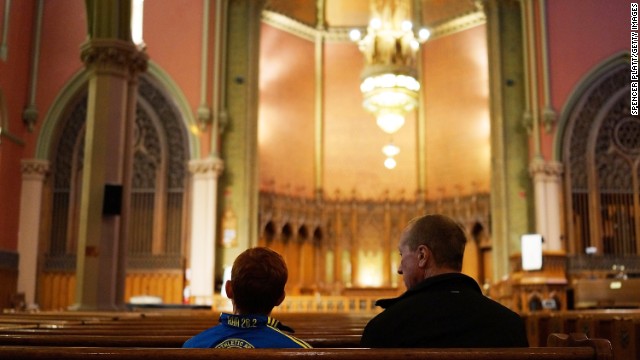
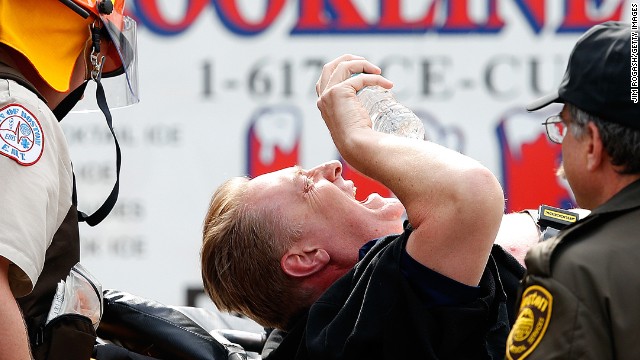
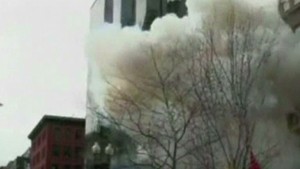
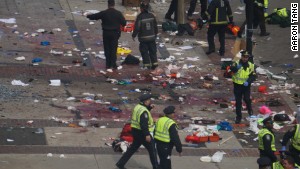
PREVIOUSLY REPORTED
Investigation
-- Significant progress has been made in the investigation but there has been no arrest, the FBI told CNN.
-- After sources told CNN that an arrest had been made, sources with the Department of Justice and Boston Police Department each said that no arrest had been made.
-- A source with Boston law enforcement said, "We got him," but would not clarify whether that meant an identification had been made or an arrest carried out.
-- Some federal sources said that it would be going too far to say even that an identification had been made, but several sources in Boston disputed that, saying a clear identification had been made.
-- Investigators believe they have identified a suspect in the marathon bombings, a source who has been briefed on the investigation told CNN's John King. The possible breakthrough came from an analysis of video from a Lord and Taylor department store near the site of the second blast, and video from a Boston TV station helped as well, the official said.
-- Obama received updates overnight about the investigation, a White House official said.
-- White House officials have been briefed by senior members of the federal response and law enforcement team over the past two days.
-- Authorities are processing "the most complex crime scene that we have dealt with in the history of our department," said Ed Davis, the Boston police commissioner.
-- Forensic specialists and dogs trained to detect explosive devices and their residue were at the scene of the blasts. A command post has been created, with 1,000 officers conducting interviews and gathering details.
-- Authorities have received 2,000 tips from around the world, said Richard DesLauriers, the special agent in charge of the FBI's Boston office. "Someone knows who did this," he said.
The casualties
The blasts left three people dead.
They are:
-- Martin Richard, an 8-year-old boy with a gap-tooth grin and bright eyes. He loved to run and play in his yard.
-- Krystle Campbell, a 29-year-old freckle-faced woman described by her mother as having "a heart of gold."
-- Lingzi Lu, a Boston University graduate student in mathematics and statistics.
She and two friends were watching the race near the finish line when the blasts erupted, BU Today reported. The second student was in stable condition at Boston Medical Center; the third student was not hurt, it said.
The explosions wounded 183 people.
Of them:
-- Martin's mother and sister are among the wounded. His mother underwent surgery for a brain injury, and his 6-year-old sister lost her leg.
-- Doctors say dozens of victims suffered injuries to their legs that involve blood vessels, bone and tissue.
-- The bombings resulted in at least 13 amputations and left doctors picking ball bearings out of victims in the emergency room, a terrorism expert briefed on the investigation said.
The explosions
-- A lid to a pressure cooker, thought to have been used in the bombings, was found on a roof near the scene of the blasts, a federal law enforcement official with knowledge of the investigation tells CNN.
-- The two bombs hit 12 seconds apart near the marathon's finish line.
-- One of the two bombs was housed in a pressure cooker hidden inside a backpack, the FBI said. To maximize the impact of the shrapnel, the device may have included "nails, BBs and ball bearings."
-- The second bomb was also in a metal container, but there's not enough evidence to determine whether it too was in a pressure cooker, the agency said.
-- Evidence recovered from the scene will be sent to the FBI's lab in Quantico, Virginia, where analysts will attempt to reconstruct the devices used in the attack.
Pressure cooker bombs
-- The simplicity of the bomb makes it hard to trace it to any particular group, an official said.
-- The "recipe" for the bombs ignited by pressure cookers can be found widely on the Internet.
-- In 2004, Homeland Security issued an advisory about pressure cooker bombs.
-- They are made by placing TNT or other explosives in a pressure cooker and attaching a blasting cap at the top, the advisory said. Pressure cooker bombs are made with readily available materials.
-- Though it could indicate domestic terrorism, such bombs have been used in a handful of instances related to international terrorism attempts over the last few years, an official said.
Terror group links
-- No connection has been made to any terrorist group or individual.
-- "There is no reporting indicating a foreign connection, or any reaction from al Qaeda," a senior U.S. official said.
-- Obama described the bombings as an act of terrorism, but said it is unclear whether they were the work of a group or "a malevolent individual."
-- The Pakistani Taliban has said it was not involved in the attack.
-- Authorities don't have a sense of what the motive is, and no one is in custody, an official said.
-- DesLauriers, the FBI special agent, asked the public to report anyone who talked about targeting the marathon or showed interest in explosives. He urged anyone who might have heard explosions in remote areas -- possibly by someone testing a bomb -- or seen someone carrying "an unusually heavy, dark-colored bag" around the time of the attack to come forward.
No Saudi connection
-- U.S. officials have said that more than one Saudi has been interviewed, including a 20-year-old student who was questioned as a possible witness.
-- But a U.S. official said the student "was just in the wrong place at the wrong time."
-- The Saudi Embassy in the United States said no Saudi appears to have been involved.
"The embassy stresses that there is no evidence, according to U.S. authorities, of involvement of any Saudi national in the bombings," it said Tuesday in a statement.
-- The investigation is inconclusive.
"They thought they had something with the Saudi national, and that evaporated," a senior law enforcement official said. "There's no sense that they have latched onto anybody or any motive."
-- Authorities are asking those who may have video or pictures taken of the scene around the time of the blasts to call city or FBI hot lines.
Security elsewhere
-- Cities have stepped up security after the attacks, including Washington, New York, Miami, Chicago, Atlanta and Los Angeles.
-- British police said they are reviewing the security plan for the London Marathon scheduled for Sunday. The marathon will observe 30 seconds of silence and is urging runners to wear a black ribbon to mark the Boston tragedy.
Reaction
-- "Boston is not going to be intimidated by this," said Secretary of State Kerry, a former U.S. senator from Massachusetts, in testimony to the House Foreign Affairs Committee Wednesday. "But we are going to find out who did this. The police work being done is extraordinary. The FBI is remarkable. There is a great deal of forensic evidence. We are hopeful we can bring people to justice."
-- "The Islamic Republic condemns killing of innocent people in U.S. Boston, Pakistan, Afghanistan, Iraq and Syria in equal measure," Iran's Ayatollah Ali Khamenei said Wednesday, according to a report from the country's state-run Press TV.
Tributes
-- Obama will travel to Boston on Thursday for an 11 a.m. interfaith service dedicated to the victims.
-- Crowds gathered for a vigil on the Boston Common on Tuesday night. They sang songs and lit candles, and some wept.
-- In New York, the Yankees played "Sweet Caroline" during their game against the Arizona Diamondbacks in a tribute to the victims. The Boston Red Sox team has played the Neil Diamond song during its games for the past 15 years.
CNN"s Steve Almasy and Faith Karimi wrote this report from information provided by CNN staffers.







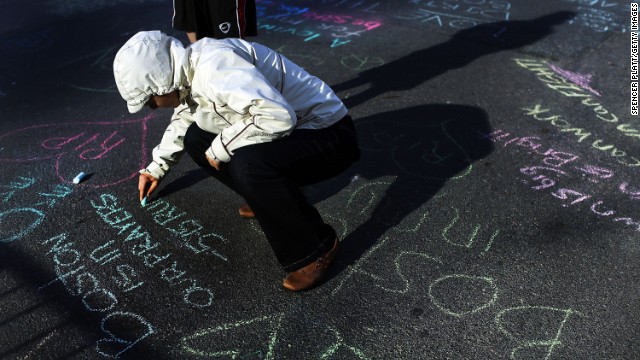 Danielle Cerroni writes a chalk message on the street on Wednesday, April 17, at the scene of the explosions near the finish line of the Boston Marathon. Two bombs exploded during the April 15 race, leaving three people dead and more than 170 others injured. People across the country continue to pay tribute to the victims.
Danielle Cerroni writes a chalk message on the street on Wednesday, April 17, at the scene of the explosions near the finish line of the Boston Marathon. Two bombs exploded during the April 15 race, leaving three people dead and more than 170 others injured. People across the country continue to pay tribute to the victims.
No comments:
Post a Comment